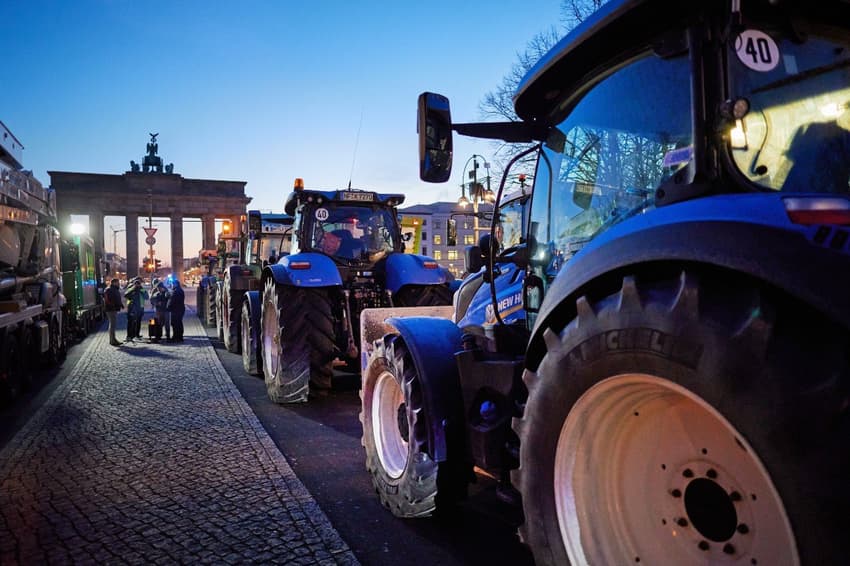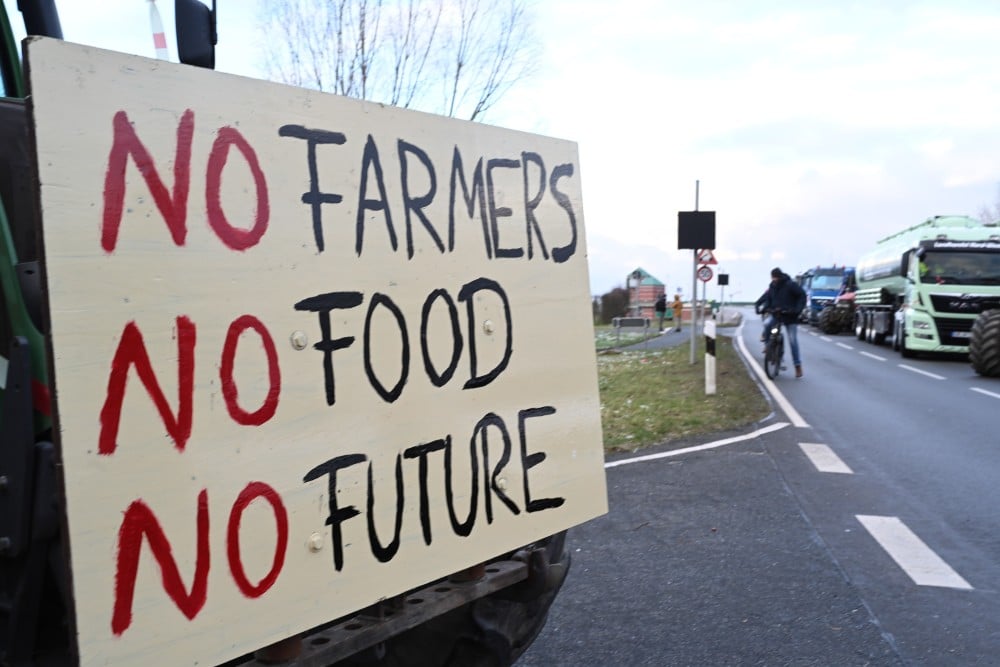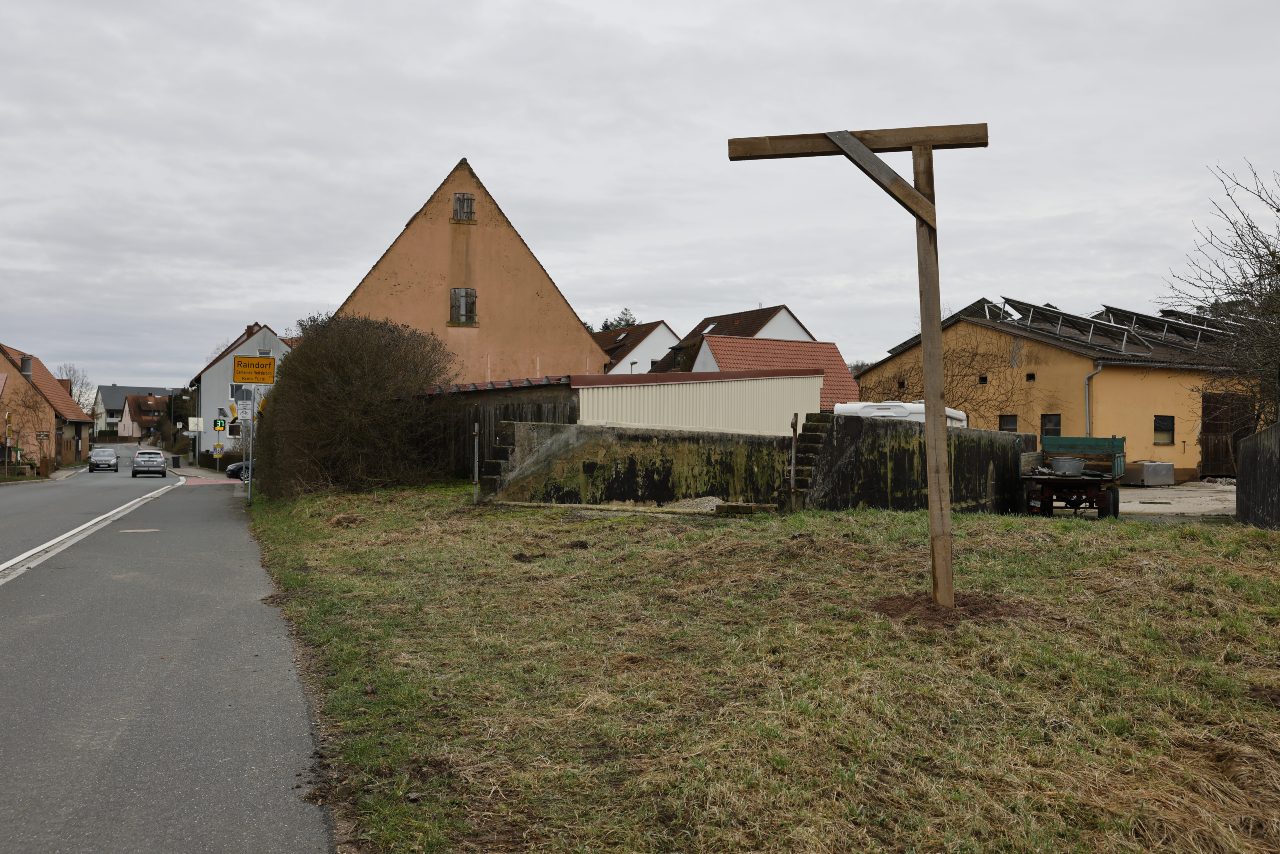ANALYSIS: Why are German farmers so angry?

Manure dumped outside of MP's houses, thousands of tractors blocking the streets - the impact of the farmers' protests has been felt far and wide in Germany. What are they so enraged about?
Whether it's the sheer scale and disruption of thousands of tractors descending on German cities or the furious outbursts reported in tabloid newspapers, the farmers' protests in Germany are proving impossible to ignore.
On Friday, January 5th, more than a hundred farmers blocked a ferry port as Economics Minister Robert Habeck tried to return from a holiday with his wife on the North Friesian island of Hooge. According to media reports, some of the protestors tried to storm the ferry that the Habeck and his wife were on, preventing the Green Party politician from disembarking and forcing police to intervene.
Ostensibly, this is all about the government's austerity measures - but the rage expressed by the farming community also runs much deeper than that.
Here's what to know about the people behind the protests, and what they're all so angry about. If you want to hear The Local team discuss this issue, check out our podcast:
LISTEN: Strikes, protests and the far-right: The challenges facing Germany in 2024
What are the farmers protesting about?
On the face of it, this all relates back to the government's planned cuts to make up for a €60 billion black hole in its budget in 2023 and 2024.
With the debt break capping borrowing at just 0.35 percent of GDP, the three parties of the traffic-light coalition - the Social Democrats (SPD), Greens and Free Democrats (FDP) - battled for weeks over how to make savings, while also looking at potential tax hikes.
In the end, two agricultural subsidies were earmarked to fall victim to the cuts: a tax break for the purchase of agricultural and forestry equipment and a subsidy for buying agricultural diesel.
This announcement was ultimately what gave rise to the current protests and, despite the government pledging to phase out the diesel subsidy more gradually, the farmers say this isn't enough.
READ ALSO: How Germany plans to solve its budget crisis in 2024
But is this really all about subsidies?
Not really. Though the planned cuts may have ignited the current wave of fury, most commentators agree that they merely fanned the flames of resentments that agricultural workers have been feeling for some time.
Thanks to tough competition on global markets and the volatility of food prices, the vast majority of smaller and medium-sized farms in Germany are reliant on state subsidies from the EU and the federal government to survive.

A protest sign held up in Jemgum, Lower Saxony. Photo: picture alliance/dpa | Lars Penning
Many farmers make a loss on much of the food they produce and sell, stoking fears that the industry iis unsustainable without state support and making smaller farmers fear for their existence.
Though the agricultural diesel subsidy makes up just six percent of subsidies from the German government, the cut has been seen as another sign of neglect for a struggling industry and and that farmers' hard work and contribution to society just isn't recognised.
Farmers equally complain that they are increasingly overloaded with new regulations and bureaucracy, especially when it comes to the push to modernise farming methods, improve animal welfare and protect the environment by avoiding things like insect-harming pesticides.
But while consumers demand high-quality, ethical products - and especially meat - there doesn't seem to be a corresponding appetite to pay for it, farmers say. Instead, people continue to want to buy low-cost meat and other products at discounters, rather than paying a premium for better welfare standards.
READ ALSO: 'We don't get enough money' - Furious farmers stage Germany-wide tractor blockades
Though the vast majority of the public support the farmers' protests, there is also the feeling in the agricultural sector that farmers are undervalued in society and that they are scapegoated for climate and animal welfare issues.
This might go some way to explain why anger has been directed at the Greens in particular - whether it's Economics Minister Habeck or the Greens politician in charge of the agricultural brief, Cem Özdemir.
Are farmers really struggling that much?
That all depends which farmers you're talking about. The German agricultural industry, which consists of around a million workers operating around 263,500 farms, is a hugely diverse industry, ranging from small organic vegetable-growers to major battery farms.
Over the past 25 years, the number of farming businesses in Germany has halved, with small players getting priced out of the market and replaced by larger corporations.
According to research published on Fragenstaat.de, around 3,5000 agricultural businesses close down in Germany each year.
That said, it's not all doom and gloom for the farmers. According to the German Farmers' Association (DBV), farms achieved record results in the past 2022/23 financial year thanks to the hikes in food prices.
And while the cuts to subsidies may hurt farmers too, the general consensus is that they're not life-threatening: a farm that uses 13,000 litres of diesel in 2024 will face a tax bill that's around €1,000 higher in 2025.
Nevertheless, the pattern of consolidation is still a major worry for smaller business owners, since large companies do better out of state subsidies and are also hurt far less by the cuts.
Who are the people behind the protests?
At the moment there appears to be two sides to the protests: the farmers' lobby, a mainstream political force led by the DBV, and fringe extremist elements both within and outside of the farming industry.
While the farmers are traditionally close to the conservative CDU and CSU in parliament, the far-right AfD has been one of the parties most vocally supporting the farmers' protests, and violent and nationalist imagery has regularly cropped up at protests.
One particularly disturbing piece of symbolism has been the gallows erected at the sides of roads or hung from tractors at demos - with some of the hanged men being painted in colours representing each of the three traffic-light parties.

Gallows erected at the side of the road as part of the farmers' protests in Bavaria. Photo: picture alliance/dpa/NEWS5 | Oßwald
Far-right demos organised by extremist groups like Freie Sachsen, the Identitarian Movement and certain 'Querdenker' groups promoting Covid conspiracy theories have cropped up alongside - and supposed in solidarity with - the farmers protests.
READ ALSO: Number of right-wing extremists in Germany 'triples'
But there are fears that these groups are simply co-opting, and corrupting, the farmers' discontent to further their own ends. Though the farmers' complaints may well be legitimate, they could well be buried in climate denialism, general anti-government sentiment and far-right fantasies of systemic collapse.
Comments
See Also
Whether it's the sheer scale and disruption of thousands of tractors descending on German cities or the furious outbursts reported in tabloid newspapers, the farmers' protests in Germany are proving impossible to ignore.
On Friday, January 5th, more than a hundred farmers blocked a ferry port as Economics Minister Robert Habeck tried to return from a holiday with his wife on the North Friesian island of Hooge. According to media reports, some of the protestors tried to storm the ferry that the Habeck and his wife were on, preventing the Green Party politician from disembarking and forcing police to intervene.
Ostensibly, this is all about the government's austerity measures - but the rage expressed by the farming community also runs much deeper than that.
Here's what to know about the people behind the protests, and what they're all so angry about. If you want to hear The Local team discuss this issue, check out our podcast:
LISTEN: Strikes, protests and the far-right: The challenges facing Germany in 2024
What are the farmers protesting about?
On the face of it, this all relates back to the government's planned cuts to make up for a €60 billion black hole in its budget in 2023 and 2024.
With the debt break capping borrowing at just 0.35 percent of GDP, the three parties of the traffic-light coalition - the Social Democrats (SPD), Greens and Free Democrats (FDP) - battled for weeks over how to make savings, while also looking at potential tax hikes.
In the end, two agricultural subsidies were earmarked to fall victim to the cuts: a tax break for the purchase of agricultural and forestry equipment and a subsidy for buying agricultural diesel.
This announcement was ultimately what gave rise to the current protests and, despite the government pledging to phase out the diesel subsidy more gradually, the farmers say this isn't enough.
READ ALSO: How Germany plans to solve its budget crisis in 2024
But is this really all about subsidies?
Not really. Though the planned cuts may have ignited the current wave of fury, most commentators agree that they merely fanned the flames of resentments that agricultural workers have been feeling for some time.
Thanks to tough competition on global markets and the volatility of food prices, the vast majority of smaller and medium-sized farms in Germany are reliant on state subsidies from the EU and the federal government to survive.

Many farmers make a loss on much of the food they produce and sell, stoking fears that the industry iis unsustainable without state support and making smaller farmers fear for their existence.
Though the agricultural diesel subsidy makes up just six percent of subsidies from the German government, the cut has been seen as another sign of neglect for a struggling industry and and that farmers' hard work and contribution to society just isn't recognised.
Farmers equally complain that they are increasingly overloaded with new regulations and bureaucracy, especially when it comes to the push to modernise farming methods, improve animal welfare and protect the environment by avoiding things like insect-harming pesticides.
But while consumers demand high-quality, ethical products - and especially meat - there doesn't seem to be a corresponding appetite to pay for it, farmers say. Instead, people continue to want to buy low-cost meat and other products at discounters, rather than paying a premium for better welfare standards.
READ ALSO: 'We don't get enough money' - Furious farmers stage Germany-wide tractor blockades
Though the vast majority of the public support the farmers' protests, there is also the feeling in the agricultural sector that farmers are undervalued in society and that they are scapegoated for climate and animal welfare issues.
This might go some way to explain why anger has been directed at the Greens in particular - whether it's Economics Minister Habeck or the Greens politician in charge of the agricultural brief, Cem Özdemir.
Are farmers really struggling that much?
That all depends which farmers you're talking about. The German agricultural industry, which consists of around a million workers operating around 263,500 farms, is a hugely diverse industry, ranging from small organic vegetable-growers to major battery farms.
Over the past 25 years, the number of farming businesses in Germany has halved, with small players getting priced out of the market and replaced by larger corporations.
According to research published on Fragenstaat.de, around 3,5000 agricultural businesses close down in Germany each year.
That said, it's not all doom and gloom for the farmers. According to the German Farmers' Association (DBV), farms achieved record results in the past 2022/23 financial year thanks to the hikes in food prices.
And while the cuts to subsidies may hurt farmers too, the general consensus is that they're not life-threatening: a farm that uses 13,000 litres of diesel in 2024 will face a tax bill that's around €1,000 higher in 2025.
Nevertheless, the pattern of consolidation is still a major worry for smaller business owners, since large companies do better out of state subsidies and are also hurt far less by the cuts.
Who are the people behind the protests?
At the moment there appears to be two sides to the protests: the farmers' lobby, a mainstream political force led by the DBV, and fringe extremist elements both within and outside of the farming industry.
While the farmers are traditionally close to the conservative CDU and CSU in parliament, the far-right AfD has been one of the parties most vocally supporting the farmers' protests, and violent and nationalist imagery has regularly cropped up at protests.
One particularly disturbing piece of symbolism has been the gallows erected at the sides of roads or hung from tractors at demos - with some of the hanged men being painted in colours representing each of the three traffic-light parties.

Far-right demos organised by extremist groups like Freie Sachsen, the Identitarian Movement and certain 'Querdenker' groups promoting Covid conspiracy theories have cropped up alongside - and supposed in solidarity with - the farmers protests.
READ ALSO: Number of right-wing extremists in Germany 'triples'
But there are fears that these groups are simply co-opting, and corrupting, the farmers' discontent to further their own ends. Though the farmers' complaints may well be legitimate, they could well be buried in climate denialism, general anti-government sentiment and far-right fantasies of systemic collapse.
Join the conversation in our comments section below. Share your own views and experience and if you have a question or suggestion for our journalists then email us at [email protected].
Please keep comments civil, constructive and on topic – and make sure to read our terms of use before getting involved.
Please log in here to leave a comment.